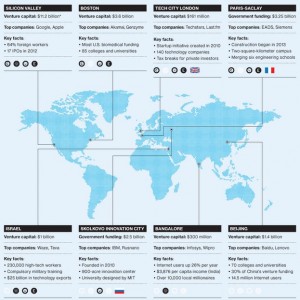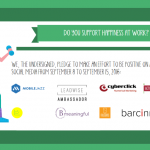This article is based on interviews with changemakers, influencers and innovation practitioners: Joan Marti Estevez (Acc1o), Jorge Juan Fernandez (Biocat & Hospital Sant Joan de Déu), Sonia Mulero (Fundacion INLEA), Jesus Purroy (Parc Científic Barcelona), Marc Ramis (Tech & Business Innovation), Joan Cortes (Lead To Change) and Nigel Ten Fleming (Adventura Capital) and many more brief encounters. It shows lessons learned, reflections, announcements and an overview on the current state of innovation in Barcelona. The article is divided in two parts.
Introduction
“Do you like Barcelona?” was the most heard question during my first year in this city. It can be interpreted in several ways, of which the City of Barcelona (Barcelona Growth: great opportunity brochure) made a nice description: “Barcelona has unique assets related to climate, quality of life, culture, creativity, entrepreneurship, leisure, architecture, sport, gastronomy…” From a business perspective, you can add to it infrastructure, great universities, knowledge institutes and science parks, diversified economy, openness of the economy and a natural ‘hub’ place within the Mediterranean Sea.
And I must agree, Barcelona has a lot to offer on all those different fronts and it is a great city to work in, to live and to enjoy and discover the beauty of life. It has much more to offer than “fiesta and siesta”. The city is continuously reinventing itself and this creates and attracts talent.
Outside of Barcelona, it is mostly referred to as that wonderful city of Gaudi, with the 4.2 km wide beaches and 311 sunny days. The Barcelona brand is very positive in this perspective. However, business wise, it suffers from the economic downturn and unemployment rate’s associated with Spain and also the independent movement makes the outside world unsecure about what to expect.
The city is made up of and by its people. Behind the glamour of the touristic highlights, the delightful and joyful brochures pointing towards the success of the region, how do the experts value the innovative capacity of Barcelona? The past months I made a round among different change makers, influencers and innovation practitioners to hear their story. Catalans, Spaniards and Internationals from different sectors divided across three pillars: knowledge, government and industry (both multinationals as SME/ startups). Do they believe that Barcelona deserves a stance in the lists of most promising innovative region, next to Silicon Valley, Boston, Tech City London, Paris-Saclay and Solkovo Innovation City? Is Barcelona heading for a tipping point to become an international and well esteemed hub for entrepreneurship and innovation? A lot of respondents mentioned: “We see the same dynamics occur here as in the late 80ties in Boston.”
The World Technology Hubs (technologyreview)
Accelerate and prepare for the Tipping Point
The innovation culture is evolving. Jorge Juan Fernandez (Biocat) sees more and more people being involved in innovation and entrepreneurship in Barcelona. “Three years ago no specialized VC could be found in Barcelona, currently there are 3 dedicated to health. It is slowly growing.” Both the public and the private sector is stimulating the upheaval of Barcelona as an Innovation Hub. Articles like “Smart cities to tech start-ups: the future is very present” show this growing wish. Some make critical remarks and point towards the hard legislative environment, hampering entrepreneurship (e.g. paying tax upfront). Innovation in Barcelona was a rising star until the crisis bumped in and made easy available money disappear. This resulted in an extraordinary nexus in history: the rise of the knowledge economy and downsizing force of the crisis. Others want to make use of the sensation and the opportunities that can be created from chaos and turn the innovation hub wish into a self-fulfilling prophecy. Jesus Purroy framed it as follows: “We still need to prove what we are worth. It is in our interest to go beyond the 100%, than we will make it happen.” Perhaps with a little help. Overall, the call to action could be heard.
 The four big needs
The four big needs
What are the focus points of this call to action?
First of all, the financing question. Whether it is venture capital or government capital, all acknowledge the importance of funding. The point of view differs with regards to the level of involvement of the government, but all state that a first push is needed. And the problem is: the government has no deal power to provide this push. Successful (exit) stories are needed to spur innovation and show that it is possible to make money in BCN. Somehow, it is a vicious circle: no success stories, no capital, no capital, no success story. What is needed to have a breakthrough, so that we can go to a virtuous circle where success breeds success?
1) Focus on valorization (technology transfer). Technology transfer in BCN is slow. It seems that scientists in general don’t want to be entrepreneurs, but who is taking it up then? Universities are by nature not entrepreneurial. They should be trained in this perspective. Give the skills and bring the innovation to the street, instead of being unconnected islands with their own expertise. Or as Sonia Mulero framed it: “The key to innovation is collaboration.”
2) Mentorship. SME’s, startups and entrepreneurs should have access to mentors. An important item in this is the knowledge sharing business development skills and the ability to scale fast. According to Nigel Ten Fleming, the mentorship means guidance, reflection and advice in the rational, systematic, blocking and tackling process of finding money or products and the introduction in relevant networks.
3) A cultural change is needed. This cultural change is mostly focused at the risk averseness, but the underlying and even more relevant observation is the educational system. The educational system should already nurture entrepreneurship. Only that way we can really make a change and prepare for the future. Part of what should be thought is the willingness to take risk. Take away the fear.
4) Flexibility of established institutions to adapt to the demands of the fast changing (technological) landscape. The flexibility is needed both in legislation as in experimentation site’s. For VC’s to start investing in a Spanish startup it still isn’t easy and presents a legislative hurdle. In general, there is a need for fair national taxes and incentives for investment in support of the knowledge economy. However, this is the least likely to happen in the short term.
The Strengths of Clusters
Barcelona has a lot of hidden areas, where innovation occurs. To make the best out of these, Catalonia has a cluster policy. Clustering is a humanistic approach to create winning strategies, either through new business segmentation, business model innovation or focus towards leadership. Furthermore, clusters help identify the sectors where to invest resources. Joan Marti Estevez (Acc10) sees the sophisticated cluster ecosystem as one of Barcelona’s unique selling points. “Acc10 was one of the first institutions worldwide to start pioneering with the cluster policy and continuous to do so. Together with Michael Porter, Acc1o designed the theory of clustering in Catalonia to improve the competiveness of the wide area of 25 industries present in this region. “Historically, Catalonia is very strong in textile and this is still reflected by the fashion industry with large international players as Inditex, Desigual and Pronovia, but also new innovative companies as InnoValley experimenting with smart fabrics. Nowadays, the variety of clusters is much broader and differs from the gourmet food cluster to the rail group. Click here for a complete overview. Because of the excellence in clustering, The Competiveness Institute (TCI), an international think-tank, is based in this city. And that brings us to the question: what are the promising innovations from these clusters?
Promising innovations from Barcelona
The respondents highlighted several companies from (founded in) Barcelona, which have shown or are showing an interesting approach and can be seen as examples of innovation in Barcelona:
- Dry Blood Spot Screening (enlarging medical reach)
- STAT diagnostica (clinical decentralized testing)
- Intelliment security (network infrastructure integrator)
- Kantox (disrupting the banking sector)
- Medtep (monitoring health)
- Softonic (destination for software downloads)
- Leitat (example of diversification: from textile to many clusters)
- Intelligent Pharma (artificial intelligence)
- Lékué ( putting customers problems central, shift from plastic to luxury kitchen appliances)
- Desiguals ( brand experience innovation)
- Grifols (new technologies for using plasma in biotech)
- Ficosa (bringing internet into the car)
Next week in part two of this interview cycle, I will go in depth into the culture of risk averseness, the promising healthcare & life sciences cluster, the right ‘yes we can’ spirit, knowledge economy peculiarities and fostering mentorship. Furthermore, some tips & tricks from the respondents will be shared. For now, some announcements & initiatives to check in 2014:
- Nucleus of Innovation (share technology challenge) and other KTT support programs from Acc1o
- Startup Catalonia program
- Check the Biocapsules training for startups and the Design Health Barcelona program. It has been considered by Health Startup Europe as “probably the most impressive accelerator/ fellowship program we’ve seen emerge in Europe”
- INLEA is working on launching a project around the internet of things in order to enable more valorization from universities.
- The BCNKey campus must become a HUB for entrepreneurs; an urban network. More details will be presented in February 2014.
- Joves i ciencia and the Locos por la Ciencia program, for which students can apply until February 21st.
Photo credits
Architecture in Barcelona via Shutterstock
Barcelona skyline via Shutterstock








Very good!
Pary 2?